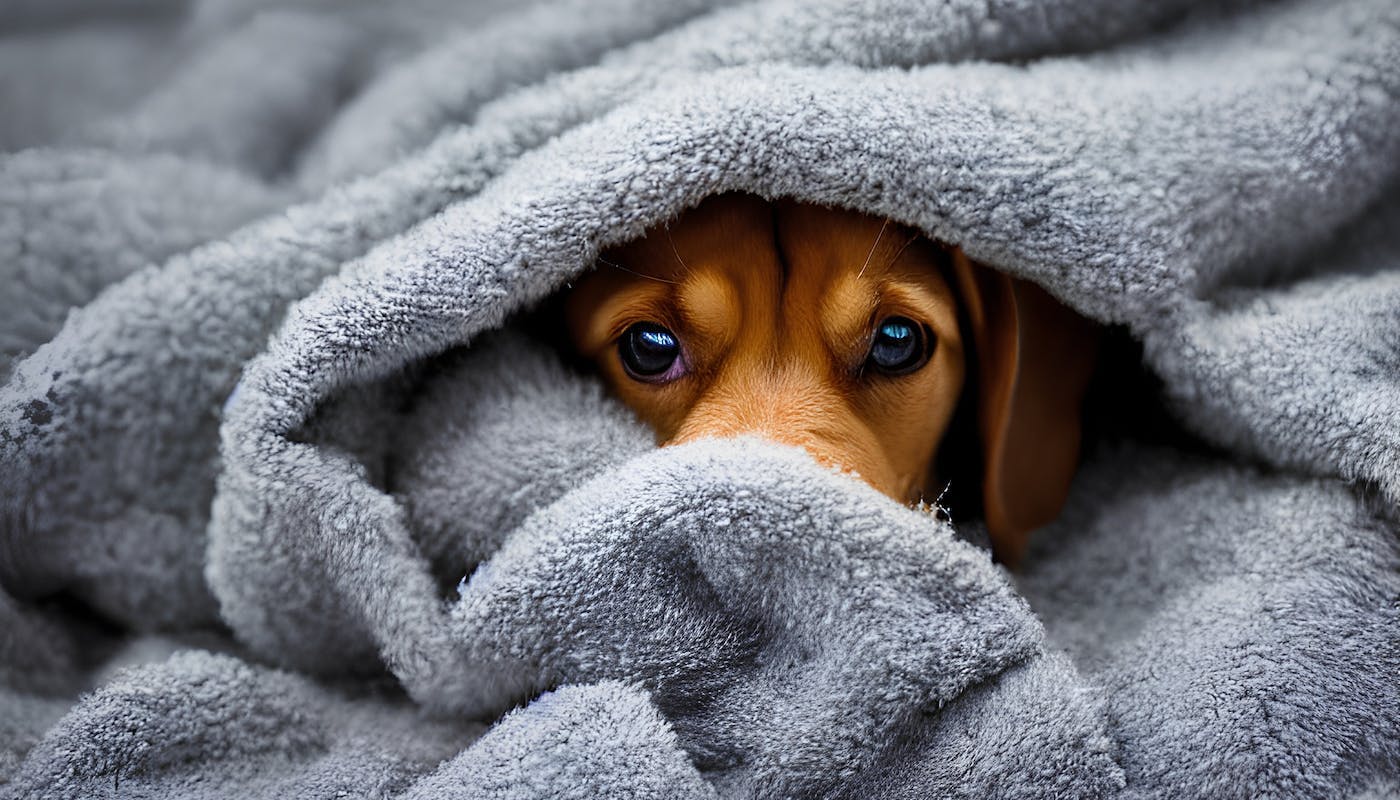My Dog is Scared of Loud Noises… How Can I Help?
Is your dog scared of loud noises like thunderstorms and fireworks? It’s very common. In fact, dogs become alert to unusual activity so they’re ready to respond or protect. But for some dogs, loud noises can cause unnecessary and harmful stress. In this article we’ll look at some ways to help your dog learn to handle loud noises – so you can both sleep more peacefully.
Why is My Dog Scared of Loud Noises?
The instinct to fear loud noises is perfectly logical. It’s a protective instinct: in the wild, dogs evolved to be alert to danger. After all, the dogs who ignored loud noises weren’t the dogs who survived (or bred) successfully.
When they hear an alarming noise, most dogs (…at least half, and probably more) have a physiological response. Adrenaline is released inside the body, which causes a spike in cortisol – the stress hormone. This produces a faster heart rate, higher blood pressure, and a pause in digestion.
Dogs display this fear in several different ways:
- Panting fast.
- Pacing.
- Staying close to you. They might jump onto your lap or search for you.
- Licking their paws or lips (a sign of stress).
- Cowering, or adopting a submissive position, with their ears back.
- Looking for a safe hiding place like beneath the bed or couch, or in the bathroom.
- Trembling or accidentally urinating.
My Dog is Scared of Loud Noises on a Walk…
Out walking, your dog can hear hundreds of different noises. Did you know that dogs can hear four times further than humans – up to around 80 feet away? They also have a greater range, so they hear a lot of high-pitched sound that isn’t detectable by the human ear. Their range of hearing means that sudden, loud noises (like a car engine backfiring) can be extremely startling. For a dog who’s already alert, aroused or stressed/learn/dog-health/signs-of-stress-in-dogs (perhaps by meeting another dog or just the excitement of being on a walk), a loud noise can trigger an additional increase in adrenaline.
My Dog is Scared of Thunderstorms…
Scientists are kind of transfixed by the canine response to thunderstorms. Why? Dogs seem able to sense changes in the atmosphere – and some can predict a thunderstorm. When the air becomes charged, many dogs know that they need to be grounded (which is why they head for the bathroom). If your dog seems afraid of thunderstorms, you can try using a thunder jacket (which combats static) or providing them with a safe space for sheltering. This fear may not be a sound aversion – it could be a biological response to the pending threat.
My Dog is Scared of Fireworks…
Your dog hears lots of loud sounds in everyday life – like shouting kids, a banging washing machine, or your favorite music – but they’re still startled by fireworks. Why? Fireworks sound like gunshots; they’re loud, they’re unexpected, and they’re nothing like your usual Tuesday night soundtrack. Dogs rely on routine, depending on the same walks, feeding times, and people every day. When it’s disrupted, even the calmest dog can become alarmed. Who can blame them?
How to Help Dogs Who Are Scared of Loud Noises…
But don’t worry. There are lots of ways to help dogs who are scared of loud noises. Here’s a round-up of our favorite ideas:
- While your dog is young, do some preparatory work so they’re ready for loud noises. Does that mean taking them to see fireworks? No. But you can acclimatize them to sounds like fireworks by playing YouTube videos at low volume. Gradually turn up the sound in the background so your pup ignores them. Consider other sources of loud noise too: take your pup for walks along noisy roads and kids’ parks. And don’t forget to vacuum around them regularly!
- Create a safe space for your dog to retreat during storms or noisy nights. This might include a radio and their favorite toys as well as their bed. Ensure the area is free of hazards and – if possible – choose a small, somewhat enclosed area so that they feel protected. Shut windows and close drapes to reduce sensory overload.
- If possible, allow your dog to choose their safe space. It might be alongside you! If it’s manageable, let them do it. Don’t scold them or force them to behave; sometimes our dogs will instinctively develop a coping strategy.
- If you’re going out or to bed, switch on the radio in your dog’s favorite room. Background noise can hide loud noises like fireworks or thunder. Experts usually recommend classical music. But there’s a lot of debate about dogs’ favorite type of music! In 2017, a Scottish study found that dogs had lower stress levels while listening to reggae and soft rock.https://eprints.gla.ac.uk/135846/ You could experiment to find out whether this helps – and let us know if your dog has a fave band.
- It’s advised that you don’t give too much attention to a stressed dog. It feels right, but it can reinforce their negative behaviors. If you’re cuddling them and constantly checking on them, they’ll know that something is awry. Instead, give them a gentle pat and act as though everything is cool…
- Try some home remedies for anxiety. During fireworks season, ensure that your dog is exercised during daylight hours – this way they’re not worried on a walk, and they’re tired by evening. To help them settle at home, you could try aromatherapy: lavender oil is thought to help dogs as well as humans.
Further Reading
Find out what it means if your dog howls along to the music/learn/dog-lifestyle/do-dogs-like-classical-music you’ve switched on! Learn about looking after your dog during fireworks season./learn/dog-training/how-to-calm-your-dog-during-fireworks-season If your dog seems to be regularly stressed, read about identifying, managing and treating dog anxiety/learn/dog-health/dog-anxiety-facts-tips-and-treatment-options.
